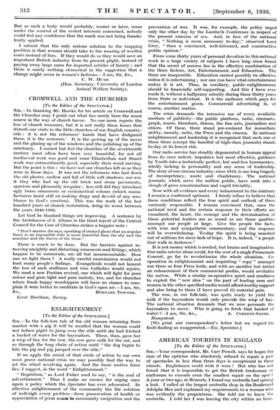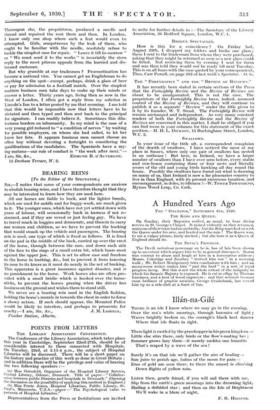AMERICAN TOURISTS IN ENGLAND
[To the Editor of the SPECTATOR.] Sur,—Your correspondent, Mr. Carr Powell, says he hopes the ease of the optician who absolutely refused to repair a pair of spectacles in less than three days is exceptional in these islands. Englishmen could wish it were ! But who has not found that it is impossible to get the British tradesman or craftsman to execute even the smallest repair on the spot ? A year or two ago, in Brussels, I found my umbrella had sprung a leak. I called at the largest umbrella shop in the Boulevard Adolphe Max and explained my requirements to a woman who was evidently the proprietress. She told me to leave the umbrella. I told her I was leaving the city within an hour.
Thereupon she, the proprietress, produced a needle and thread and repaired the rent there and then. In London, I know only one shop where such a feat would even be attempted. Girls, sempstresses by the look of them, who ought to be familiar with the needle, resolutely refuse to tackle the simplest case for repair. "Leave it till to-morrow" or "We must send it to the works" is invariably the stern reply to the most piteous appeals from the hurried and dis- tressed customer.
But why grumble at our tradesmen ? Procrastination has become a national vice. You cannot get an Englishman to do anything on the spot—except, perhaps, drink a glass of beer or pay for admission to a football match. Over the simplest matters business men take days to make up their minds or answer a letter. Thirty years ago, living then as now in the West of London, I often got a reply from my solicitor in Lincoln's Inn to a letter posted by me that morning. I am told that this would be impossible now that letters have to be dictated and then typed and then sent back to the principal for signature. I can readily believe it. Sometimes this dila- toriness borders on inhumanity. In my mind is the case of a very young girl reduced to " a condition of nerves" by waiting for possible employers, on whom she had called, to let her know her fate. It appears business men cannot choose an office boy without devoting a fortnight to considering the qualifications of the candidates. The Spaniards have a say- ing maftana—our rule of conduct is" the week after next."—































 Previous page
Previous page